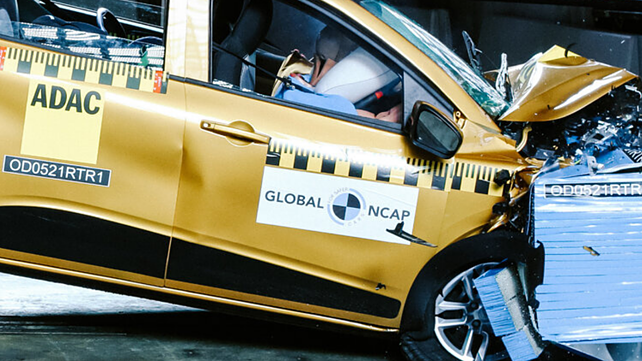
French carmaker Renault’s Multi-Purpose Vehicle (MPV) Triber is the safest car among its product portfolio. It has received four-star ratings for adult occupants and three stars for child occupants in Global NCAP’s (GNCAP) crash tests. Interestingly, no other product from Renault India has achieved this kind of rating from GNCAP crash tests.
Renault Triber was tested in its most basic safety specification, with two airbags. The Tribe showed significant improvements from previous Renault models tested by Global NCAP.
The carmaker currently sells four products - Kwid, Triber, Kiger and Duster in India.
According to earlier crash tests data, Renault’s first MPV in India, Lodgy, which was discontinued, got zero stars in old occupants in 2018. On similar lines, Its entry-level hatchback Kwid received a one-star rating in 2017 for both adult and child occupants. At the same time, Renault Duster SUV with two airbags received three stars in 2017 for adult occupants and one star for child occupants in the GNCAP crash test.
The crash test finds that the protection offered to the adult occupant driver and passenger head and neck was good. Driver’s chest showed marginal protection, and the passenger’s chest showed adequate protection. Driver’s knees showed marginal protection as they could impact dangerous structures behind the dashboard. Passenger’s knees showed good protection. Driver and passenger tibias showed adequate protection.
The bodyshell was rated as unstable, and it was not capable of withstanding further loadings. The footwell area was rated as stable. The car offers standard seat belt reminders (SBR) for driver and passenger.
Alejandro Furas, Secretary-General of Global NCAP, said Renault has significantly improved adult occupant protection performance in frontal crashes compared with 2016 tests on the Kwid. The Triber sets a strong baseline for the manufacturer, and the testing agency encourages the vehicle maker to maintain this important progress as a minimum to achieve 5-star levels of safety.
David Ward, President of the Towards Zero Foundation, said, “It is satisfying to note Renault’s safety improvements with Global NCAP’s Triber crash test result.”
In terms of child occupant protection, a child seat for the 3-year-old was installed forward-facing with adult seat belts and was not able to prevent excessive forward movement during the impact. Chest protection was average, and the head protection was low as it was exposed during the crash. The 18-month-old child restraint was installed with an adult seatbelt rearward-facing offering full protection to the child occupant. According to the testing agency, the CRS marking was permanent. The recommended CRS did not show incompatibility. The vehicle offers a lap belt in the rear centre position. The car does not offer ISOFIX anchorages.
Global NCAP awards a separate child safety rating to each car to highlight the different levels of protection vehicles provide to passengers on the rear seats. Global NCAP tests a combination of the car and child seat recommended by the car manufacturer.